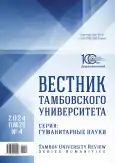Censorship of Agitprop in the Upper Volga press in the 1920s
- Authors: Assonov A.V.1
-
Affiliations:
- Yaroslavl Urban Planning College
- Issue: Vol 29, No 4 (2024)
- Pages: 1078-1086
- Section: NATIONAL HISTORY
- URL: https://journal-vniispk.ru/1810-0201/article/view/297799
- DOI: https://doi.org/10.20310/1810-0201-2024-29-4-1078-1086
- ID: 297799
Cite item
Full Text
Abstract
Importance. The censorship of periodicals in the Upper Volga region during the New Economic Policy years is considered. The research of Soviet propaganda remains relevant in the context of studying the history of the USSR, political communication and mass media. Even in modern Russia, there is a request for the development of a cultural level using the mass media, in the implementation of which the experience of a century ago can help. The purpose of the research is to examine the mechanism for implementing the censorship policy of the Soviet state in the Upper Volga region using the example of the work of agitprop.Materials and Methods. Methods of system analysis, principles of historicism and scientific objectivity are used. The archival materials stored in the Russian State Archive of Socio-Political History are used.Results and Discussion. The country needed urgent and fairly profound cultural changes, and this had to be done not only by methods of combating illiteracy, but also by propaganda, including in the periodical press. Newspapers are a cheap and easy way to disseminate information, but in an illiterate country it is not very easy to use. The party’s propaganda department had to deal with this phenomenon.Conclusion. Conclusions about the significant intervention of the Agitprop department in regional periodicals in order to form an ideologically correct understanding of the world and the political situation in the country are formulated.
Keywords
About the authors
A. V. Assonov
Yaroslavl Urban Planning College
Author for correspondence.
Email: assonov@internet.ru
ORCID iD: 0000-0001-6494-4236
Lecturer of Social and Humanitarian Disciplines Department
Russian Federation, 55 Tchaikovsky St., Yaroslavl, 150040, Russian FederationReferences
- Zhilyakova N.V., Esipova V.A., Shevtsov V.V., Mogilatova M.V. (2021). Censorial history of provincial journalism (on the materials of periodical press of the ante-revolutionary Tomsk province). Vestnik Rossiiskogo fonda fundamental’nykh issledovanii. Gumanitarnye i obshchestvennye nauki = Russian Foundation for Basic Research Journal. Humanities and Social Sciences, no. 2 (104), pp. 87-103. (In Russ.) https://doi.org/10.22204/2587-8956-2021-104-02-87-103, https://elibrary.ru/yhwffx
- Shmakov A.A. (2023). The first decrees of Soviet power in terms of propaganda. Vestnik Mariiskogo gosudarstvennogo universiteta. Seriya: Istoricheskie nauki. Yuridicheskie nauki = Vestnik of Mari State University. Chapter: History. Law, vol. 9, no. 1 (33), pp. 72-80. (In Russ.) https://doi.org/10.30914/2411-3522-2023-9-1-72-80, https://elibrary.ru/jvfdtn
- Babyuk M.I. (2020). Private periodicals in the USSR in the 1920s. Mediaskop = Mediascope, no. 1, art. 1. (In Russ.) https://doi.org/10.30547/mediascope.1.2020.1, https://elibrary.ru/bghule
- Nikitina A.S. (2023). Formation of a system coordinating the mass media of the USSR. Povolzhskii vestnik nauki = Volga Bulletin of Science, no. 4 (30), pp. 27-30. (In Russ.) https://elibrary.ru/sajurt
- Kharchenko L.N. (2020). Agitational-propagandistic activity as an instrument to form Soviet ideology (the 1920–1930s). Manuskript = Manuscript, vol. 13, no. 4, pp. 36-40. (In Russ.) https://doi.org/10.30853/manuscript.2020.4.6, https://elibrary.ru/djncdb
- Davydova T.T., Shapiro A.M. (2021). Censorship in Soviet Russia in 1910–1920s. Vestnik Russkoi khristianskoi gumanitarnoi akademii = Review of the Russian Christian Academy for the Humanities, vol. 22, no. 4-2, pp. 96-104. (In Russ.) https://www.elibrary.ru/twrdeq
- Zaseev G.A. (2022). Formation of the system for regulation of Soviet press. Izvestiya SOIGSI, no. 46 (85), pp. 80-89. (In Russ.) https://doi.org/10.46698/VNC.2022.85.46.007, https://elibrary.ru/xvqfhl
- Kirichenko S.V., Plekhanova A.M. (2020). Soviet ideology and culture in the 1920s and 1930s: upbringing a “new man”. Vestnik Tomskogo gosudarstvennogo universiteta. Istoriya = Tomsk State University Journal of History, no. 65, pp. 20-26. (In Russ.) https://doi.org/10.17223/19988613/65/3, https://elibrary.ru/xsagvg
- Babyuk M.I. (2013). On the issue of the state of the Soviet press in the early 1920s (comments on the published document of the agitprop of the Central Committee of the Russian communist party of the Bolsheviks). Istoriya otechestvennykh SMI, no. 1, pp. 101-124. (In Russ.) https://elibrary.ru/yhrbel
- Chogandaryan M.G. (2013). Methods, modes and techniques of the Soviet propaganda in 1920–1930. Teoriya i praktika obshchestvennogo razvitiya = Theory and Practice of Social Development, no. 4, pp. 181-183. (In Russ.) https://elibrary.ru/pzhprz
- Gorshkova I.O. (2023). Evolution of the Soviet political poster from 1920s to 1960s. Vestnik molodykh uchenykh Sankt-Peterburgskogo gosudarstvennogo universiteta tekhnologii i dizaina, no. 3, pp. 139-143. (In Russ.) https://elibrary.ru/qlnuha
- Kolesnichenko D.V. (2022). Anti-religious propaganda in the activities of the Main Political and Educational Committee in the 1920s. Materialy studencheskoi mezhvuzovskoi nauchnoi konferentsii «Gosudarstvennyi apparat Rossii v ehpokhu voin i revolyutsii pervoi chetverti XX v.». Moscow, Sputnik+ Publ., pp. 38-47. (In Russ.) https://elibrary.ru/supuud
- Tsyrempilova I.S. (2020). Antireligious agitation and propaganda in 1920s: its forms, experience and effectiveness (on the materials of the Baikal Region). Vlast’, vol. 28, no. 5, pp. 208-214. (In Russ.) https://doi.org/10.31171/vlast.v28i5.7605, https://elibrary.ru/byceov
- Salienko A.P. (2021). Some notes on “the art of the revolution” and “socialist art”: reservation and puzzlement. Vestnik Moskovskogo universiteta. Seriya 8: Istoriya = Moscow University Bulletin. Series 8: History, no. 1, pp. 160-183. (In Russ.) https://elibrary.ru/exohyj
- Sherimet A.G. (2022). Ideological impact in the province of the 1920s: monopolization of the process. Istoriya: fakty i simvoly = History: Facts and Symbols, no. 3 (32), pp. 86-101. https://doi.org/10.24888/2410-4205-2022-32-3-86-101, https://elibrary.ru/tifush
Supplementary files








